Lamborghini Murciélago
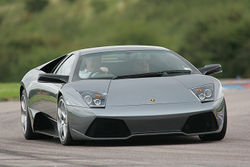 |
|
| Manufacturer | Lamborghini |
|---|---|
| Production | 2001-present 4,000+ built[1] |
| Assembly | Sant'Agata Bolognese, Italy |
| Predecessor | Lamborghini Diablo |
| Successor | Lamborghini Jota (expected in 2012) |
| Class | Sports car |
| Body style(s) | 2-door coupé or 2-door roadster |
| Layout | Mid-engine, four-wheel drive |
| Engine(s) | 6.2 L V12 580 PS (427 kW; 572 bhp) 6.5 L V12 640 PS (471 kW; 631 bhp) |
| Transmission(s) | 6-speed manual 6-speed E-gear semi-automatic |
| Wheelbase | 104.9 in (2,664.5 mm) |
| Length | 2002-06: 180.3 in (4,579.6 mm) 2007-present: 181.5 in (4,610.1 mm) |
| Width | 2002-06: 80.5 in (2,044.7 mm) 2007-present: 81.0 in (2,057.4 mm) |
| Height | 44.7 in (1,135.4 mm) 2007-present Roadster: 44.6 in (1,132.8 mm) |
| Curb weight | 1,650 kg (3,638 lb) |
| Related | Lamborghini Reventón |
| Designer | Luc Donckerwolke |
The Lamborghini Murciélago is a high-performance two-door, two-seat sports car produced by Italian automaker Lamborghini. Often referred to as a supercar, it is powered by a recent evolution of the Lamborghini V12 engine, and is the flagship of the automaker's lineup. The Murciélago was introduced as a coupé in 2001 for the 2002 model year, succeeding the famed Diablo supercar in Lamborghini's lineup. The car was the automaker's first new design in eleven years, as well as the first under the ownership of German automaker VW. The Murciélago was styled by Peruvian-born Belgian Luc Donckerwolke, Lamborghini's head of design from 1998 to 2005.[2] A roadster version of the car was introduced in 2004, followed by the updated LP 640 coupé and roadster and LP 650-4 Roadster. The most recent evolution of the model is the LP 670-4 SuperVeloce, a highly tuned version that is expected to be the last iteration of the Murciélago nameplate, before the model is replaced in early 2012.[3]
Contents |
Name
In a continuation of Lamborghini's tradition of giving its cars names from the world of bullfighting, the Murciélago was named for a fighting bull that survived 28 sword strokes in an 1879 fight against Rafael "El Lagartijo" Molina Sanchez, at the Coso de los califas bullring in Córdoba, Spain. Murciélago fought with such passion and spirit that the matador chose to spare its life, a rare honor. The bull, which came from Joaquin del Val di Navarra's farm, was later presented as a gift to Don Antonio Miura, a noted local breeder; thus began the famed Miura line of fighting bulls, which provided the name for one of Lamborghini's first great cars.
Murciélago is the Spanish name for the bat. The word is pronounced [murθiˈelaɣo], with a voiceless dental fricative [θ] (as in English thing), in the Castilian Spanish spoken in most of Spain. However, the Italian automaker often uses the Southern Spain and Latin American Spanish pronunciation, [murˈsjelaɣo], with an [s] sound.
First generation
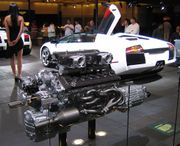
The Murciélago is a four-wheel drive, mid-engined sports car. Its coupé body is especially low-slung, with its roof rising to just under four feet above the ground. The supercar features scissor doors, which contribute to its exotic image. First-generation Murciélagos, produced between 2001 and 2006, were powered by a 6.2-litre V12 which traces its roots back to the company's beginnings in the 1960s. The rear differential is integrated into the engine unit, and the four-wheel drive features a central viscous coupler. Power was sent to the wheels through a six-speed manual. The Murciélago possesses an independent double-wishbone suspension design, and features a combination of carbon-fiber and steel bodywork. The rear spoiler and the air scoops integrated into the car's shoulders are electromechanically activated, and fold out from the body at high speeds to aid aerodynamic performance and provide additional engine cooling, respectively.
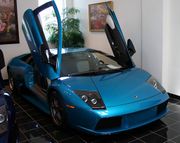
The V12 engine in these cars produced just under 580 PS, or pferdestärke (German: horse strength), a unit of power commonly used in Europe. The engine was capable of powering the car to a speed of 60 mph (97 km/h) in 3.8 seconds.[4] The first-generation cars, equipped with the 6.2-litre V12, were produced between 2001 and 2006, and are known simply as Murciélago. Although subsequent versions of the Murciélago were designated with their engine output in PS, the original cars were not designated "LP 580" in line with the later convention.
The Murciélago Roadster was introduced in 2004 as a 2005 model. A sign on the windshield header advises the driver not to exceed 100 mph (160 km/h) with the cloth top in place.[2] Designer Donckerwolke cited the B-2 stealth bomber, the Wally 118 WallyPower yacht, and architect Santiago Calatrava's Ciutat de les Arts i les Ciències in Valencia, Spain as his inspiration for the roadster's revised rear pillars and engine cover.[2]
40th Anniversary Edition
In 2003, Lamborghini celebrated its 40th anniversary by releasing an Anniversary Edition of the Murciélago. In prior decades, the company had released commemorative editions of the Countach and Diablo. The 40th anniversary cars were produced in a limited run of 50 vehicles; enhancements included a limited-edition Blue body color that was labelled "Jade-Green", carbon-fiber exterior detailing, upgraded wheels, a revamped exhaust system, and a numbered plaque displayed inside the rear window. The interior featured a new leather trim and additional electronic features.[5]
LP640
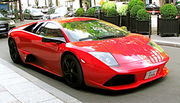

In March 2006, Lamborghini presented a new version of its halo car at the Geneva Motor Show; the Murciélago LP640. . The new designation accompanying the car's name indicated the engine's position and orientation within the car (Longitudinale Posteriore, or "Rear Longitudinal"), and referenced the V12 engine's uprated power output; with its displacement increased to 6.5 litres, the engine in the new car made 640 PS (471 kW; 631 hp) at 8000 rpm. The Murciélago's exterior received a minor facelift, with revised front and rear fascias and side air intakes. A new exhaust system is shaped into the rear diffuser, and the left-hand side air intake is enlarged to accommodate the oil cooler. A revised suspension , a launch control system, and an all-wheel drive system round out the performance modifications. A new 6-speed "E-gear" sequential automatic transmission became available as well. The LP640 wears 335/30 tires on its rear wheels. Interior seating was reshaped to provide greater headroom, and an improved stereo system forms part of the updated dashboard. The U.S. MSRP was set at $318,800. Optional equipment included Carbon fibre-reinforced Silicon Carbide (C/SiC) ceramic composite brakes, chrome paddle shifters and a glass engine cover. The 2008 car's estimated fuel economy for the 6-speed manual is 8 miles per US gallon (29 L/100 km; 9.6 mpg-imp) city and 13 miles per US gallon (18 L/100 km; 16 mpg-imp) freeway, making it the least efficient 2008 car for city and highway driving, according to the EPA.[6]
At the 2006 Los Angeles Auto Show, Lamborghini announced that the Murciélago roadster had also been updated to LP640 trim.[7]
LP640 Versace
The Murciélago LP640 Versace is a special edition of the LP640 that was first revealed at the 2006 Paris Motor Show. The twenty white and black cars feature two-tone black and white trim inside and out, with interiors finished in custom Versace leather, along with a Gianni Versace logo plaque.[8] Lamborghini also presented a black and white LP640 Roadster Versace, again only twenty were produced.[9]
LP 650-4 Roadster
In 2009, Lamborghini released a limited-run update of the Murciélago Roadster. The LP 650-4's engine is rated at 650 PS (478 kW; 641 hp) and 660 N·m (490 lb·ft), allowing the car to reach 100 km/h (62 mph) in 3.4 seconds and achieve a top speed of 330 km/h (210 mph). All cars are painted Grigio Telesto grey with Arancio orange highlights. The color scheme is continued on the interior, which features an asymmetric dash design.[10]
LP 670-4 SuperVeloce
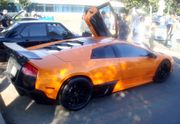
At the 2009 Geneva Motor Show, Lamborghini unveiled a new version of the Murciélago, the LP 670-4 SuperVeloce.[11] The SV moniker had previously appeared on the 1995–99 Diablo SV, a highly tuned version of the car that appeared close to the end of the model's production run. [12]
The SuperVeloce's V12 produces 670 PS (493 kW; 661 hp) at 8000 rpm and 660 N·m (490 lb·ft) of torque at 6500 rpm, thanks to improved valve timing and intake system modifications. The car's weight was reduced by 100 kg (220 lb) by swapping several interior parts and exterior panels out for carbon fiber replacements, along with the installation of a new, lighter exhaust system. The LP670-4 SV comes standard with the LP640's optional six-piston caliper, 15-inch carbon-ceramic disc brakes, slowing black 18-inch wheels. In its June 2009 issue, Car and Driver magazine predicted that the LP 670-4 SV was capable of reaching 100 km/h (62 mph) from a standing start in just 3.2 seconds. Lamborghini claims the car can reach 342 km/h (213 mph) with an optional smaller spoiler, or 337 km/h (209 mph) with the standard Aeropack wing.[13]
According to Maurizio Reggiani, head of Lamborghini R&D, the LP 670-4 SV's steering was tuned for high-speed sensitivity. Production of the top-of-the-line Murciélago was limited to 350 cars, priced at $450,000.
In April 2010, Lamborghini released a variant of the LP 670-4 called the SuperVeloce China Limited Edition. The car is distinguished by special exterior markings.[14]
Specifications
Engines
| Model | Engine | Power, Torque@rpm | Acceleration (seconds) | Top Speed | |||
|---|---|---|---|---|---|---|---|
| 0-60 mph | 0-100 mph | 0-150 mph | Quarter Mile | ||||
| Murciélago (2001–2005)[15] | 6.2 L V12 | 580 PS (427 kW; 572 hp), 649 N·m (479 lb·ft) | 3.5 | 8.3 | 21.4 | 11.7@122 mph | official: 330 km/h (205 mph) |
| Murciélago LP 640[16] | 6,496 cc (6.496 L; 396.4 cu in) V12 | 640 PS (471 kW; 631 hp)@8000rpm, 660 N·m (487 lb·ft)@6000rpm | 3.3 | 7.5 | -- | 11.4@127 mph | official: 340 km/h (211 mph) |
| Murciélago LP 640 Roadster[17] | 640 PS (471 kW; 631 hp)@8000rpm, 660 N·m (487 lb·ft)@6000rpm | 3.4 | 8.1 | 16.1 | 11.8@126 mph (203 km/h) (C&D) | official: 330 km/h (205 mph) | |
| Murciélago LP 650-4 Roadster[18] | 650 PS (478 kW; 641 hp), 660 N·m (487 lb·ft) | 3.4 | - | - | - | official: 330 km/h (205 mph) | |
| Murciélago LP 670-4 SuperVeloce | 670 PS (493 kW; 661 hp)@8000rpm, 660 N·m (487 lb·ft)@6500rpm | 2.8[19] | 6.8 | - | [email protected] (R&T) | official: 342 km/h (213 mph), 337 km/h (209 mph) with Aeropack Wing |
|
Transmissions
| Model | Standard | Optional |
|---|---|---|
| Murciélago, Murciélago LP 640, Murciélago LP 640 Roadster, Murciélago LP 650-4 Roadster | 6-speed manual | 6-speed e-Gear |
| Murciélago LP 670-4 SuperVeloce | 6-speed e-Gear | 6-speed manual |
Safety Recall
In the United States, Lamborghini is recalling 428 of its 2007–2008 Murciélago coupes and roadsters because welds holding the fuel pump support inside the gas tank could fail as the result of a poor weld. It could lead to a fuel leak and, possible fire.[20] [21]
Motorsport
R-GT
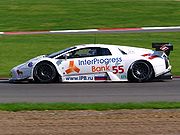
The Lamborghini Murciélago R-GT is a race-only version of the Murciélago, developed jointly with Reiter Engineering and Audi Sport. It has rear-wheel drive unlike the standard Murciélago to comply with the FIA, ACO, and JAF rules. The car retains the standard Murciélago V12, but has air restrictors to manage power. Its acceleration and top speed are highly dependent on the gearing selected for a particular race track.
In December 2006, Reiter Engineering tested an upgraded Murcielago R-GT LM, featuring redesigned body work and a new rear wing with less drag.
In March 2007 in the FIA GT Championship, the All-Inkl.com Racing Murciélago won the Zhuhai 2 Hours.
In April 2009, in an LMS 1000 km de Catalunya race, a Murcielago R-GT of the Russian IPB Spartak Racing Team won the GT1 class, against a Corvette C6-R and a Saleen S7-R. The drivers of the IPB Spartak Racing car were the Russian Roman Rusinov and the Dutch Peter Kox. They crossed the finish line 2 laps ahead of the first Corvette, in 2nd place. Before the race, the Lamborghini set the pole, but was moved to the end of the grid due to some technical irregularities. The second international win for the Ragin Bull GT car.
RG-1 (2004-)
It is a version of R-GT built for Super GT for Japanese Lamborghini Owners Club (JLOC).[22]
In March 2006 at the Super GT Suzuka 500 km, R-GT recorded the first win ever for a Murcielago when they earned a win in the GT300 class.
LP670 R-SV
It is an evolution of R-GT developed by Reiter Engineering to comply with the FIA rules for the new GT1 World Championship.
Related development
Lamborghini Miura concept
A retro-styled Lamborghini Miura concept car was presented at the Museum of Television & Radio on January 5, 2006 alongside the Los Angeles Auto Show, though it was not present at the show itself. Instead, the Miura concept car officially debuted at the North American International Auto Show two weeks later. It was the first design to be penned by Lamborghini design chief, Walter de'Silva, commemorating the 40th anniversary of the 1966 Geneva introduction of the original Miura.
Lamborghini president and CEO Stefan Winkelmann denied that the concept would mark the Miura's return to production, saying “The Miura was a celebration of our history, but Lamborghini is about the future. Retro design is not what we are here for. So we won’t do the Miura.”[23]

Lamborghini Reventón
The Lamborghini Reventón is a slightly modified version of the Murciélago. The car, featuring an upgraded interior and revamped exterior styling inspired by stealth fighters such as the F-22A Raptor, debuted at the 2007 Frankfurt Auto Show.[24] Only 20 units were built. The car's mechanical underpinnings and engine are identical to those of the Murciélago LP640. A roadster version has also been planned for production.
Successor
The development of a successor to the Murciélago has been widely speculated in the motoring press, as the supercar approaches the end of its first decade in production. Spy photos published on the internet in January 2010 showed a camouflaged Lamborghini prototype undergoing winter testing.[25] Early rumors suggest the possibility of the name "Jota", a reference to the one-off Miura variant created by Lamborghini test driver Bob Wallace in 1970.
Production
| Year | Units |
|---|---|
| 2001 | |
| 2002 | |
| 2003 | |
| 2004 | |
| 2005 | |
| 2006 | 444 |
| 2007 | 629 |
| 2008 | 637[26] |
| 2009 | 331[26] |
| Total |
References
- ↑ [1] PR from Lamborghini. Figures may include some late Diablos built in 2001.
- ↑ 2.0 2.1 2.2 Kott, Douglas (October 2004). "Lamborghini Murciélago Roadster: Thrills, intensified". Road&Track. http://www.roadandtrack.com/article.asp?section_id=6&article_id=1498. Retrieved 8-9-2009.
- ↑ "Spied: 2012 Lamborghini Jota in Near-Production Form". www.insideline.com. http://www.insideline.com/lamborghini/jota/2010/spied-2012-lamborghini-jota-in-near-production-form.html. Retrieved 2010-05-24.
- ↑ Phillips, John (July 2003). "Lamborghini Murciélago - Road Test". Car and Driver. http://www.caranddriver.com/reviews/car/03q3/lamborghini_murcielago-road_test. Retrieved 8-9-2009.
- ↑ "Lamborghini Murcielago 40th Anniversary". Lamborghiniregistry.com. http://www.lamborghiniregistry.com/Murcielago/40th/index.html. Retrieved 2009-07-26.
- ↑ "Most and Least Efficient Vehicles". EPA. http://www.fueleconomy.gov/feg/best/bestworstNF.shtml. Retrieved 2007-12-16.
- ↑ Lamborghini Takes the Wrap off the LP640 Roadster
- ↑ Lamborghini Murciélago LP640 Versace Edition
- ↑ Paris Lamborghini Murcielago LP640 Versace Unveiled
- ↑ First images of Lamborghini Murciélago LP 650-4 Roadster
- ↑ Geneva 2009: Lamborghini Murciélago LP 670-4 SuperVeloce
- ↑ Anderson, Gregory (June 2009). "2010 Lamborghini Murciélago LP670-4 SV: Just what the doctor ordered–A Murciélago with a bit more of everything.". Car and Driver 54 (12): p. 114. http://www.caranddriver.com/reviews/car/09q2/2010_lamborghini_murcielago_lp670-4_sv-first_drive_review.
- ↑ Officially Official: Lamborghini Murciélago LP 670-4 SuperVeloce
- ↑ "Lamborghini Murciélago LP 670-4 SuperVeloce China Limited Edition: A Really Long Name". Jalopnik.com. 2010-04-23. http://jalopnik.com/5522784/lamborghini-murcielago-lp-670+4-superveloce-china-limited-edition-a-really-long-name. Retrieved 2010-05-23.
- ↑ "Lamborghini Murciélago - Raging Bull Tamed?". Car and Driver. July 2003. http://www.caranddriver.com/reviews/hot_lists/high_performance/supercars_and_exotics/lamborghini_murcielago_road_test+t-counterpoint+page-2.html. Retrieved June 9, 2009.
- ↑ "600-bhp Club: Lamborghini Murcielago LP640". Road and Track. March 2009. http://www.roadandtrack.com/article.asp?section_id=7&article_id=7448. Retrieved June 9, 2009.
- ↑ "2007 Lamborghini Murciélago LP640 Roadster - Specs". Car and Driver. July 2007. http://www.caranddriver.com/reviews/hot_lists/high_performance/supercars_and_exotics/2007_lamborghini_murcielago_lp640_roadster_short_take_road_test+t-specs+page-3.html. Retrieved June 9, 2009.
- ↑ "Revealed: The New Lamborghini Murcielago LP 650-4 Roadster". Business Week (The McGraw-Hill Companies Inc). March 17, 2009. http://www.businessweek.com/lifestyle/content/mar2009/bw20090317_076120.htm?chan=autos_autos+--+lifestyle+subindex+page_top+stories. Retrieved 18 March 2009.
- ↑ "Automobili Lamborghini Holding Spa". Lamborghini.com. http://www.lamborghini.com/2006/lamboSitenormal.asp?lang=eng. Retrieved 2010-05-23.
- ↑ Christopher Jensen (2010-05-28). "Lamborghini Recalling Murciélagos". The New York Times - Wheels blog. http://wheels.blogs.nytimes.com/2010/05/28/lamborghini-recalling-murcielagos/#more-56531. Retrieved 2010-06-01.
- ↑ Chris Shunk (2010-05-24). "Lamborghini recalling 2007-2008 Murciélago models over possible fire risk". Autoblog. http://www.autoblog.com/2010/05/24/lamborghini-recalling-2007-2008-murcielago-models-over-possible/. Retrieved 2010-06-01.
- ↑ Lamborghini Murcièlago RG-1
- ↑ Lambo Plans - AutoWeek Magazine
- ↑ "The Lamborghini Reventón Has Been Revealed". Edmunds. http://blogs.edmunds.com/Straightline/3347. Retrieved 2008-03-13.
- ↑ "Spy Shots: Lamborghini "Jota" Murciélago replacement caught in snow". January 15, 2010. http://www.autoblog.com/2010/01/15/spy-shots-lamborghini-jota-murcielago-replacement-caught-in-s/.
- ↑ 26.0 26.1 Audi 2009 investor report, p.147
External links
| layout / type / class |
1980s | 1990s | 2000s | 2010s | |||||||||||||||||||||||||||||
| 0 | 1 | 2 | 3 | 4 | 5 | 6 | 7 | 8 | 9 | 0 | 1 | 2 | 3 | 4 | 5 | 6 | 7 | 8 | 9 | 0 | 1 | 2 | 3 | 4 | 5 | 6 | 7 | 8 | 9 | 0 | 1 | ||
| owner | <··· receivership | Mimram | |||||||||||||||||||||||||||||||
| mid- engine |
V8/V10 | Superleggera | |||||||||||||||||||||||||||||||
| Jalpa | Gallardo | ||||||||||||||||||||||||||||||||
| V12 | <··· Countach | Diablo | Murciélago | ||||||||||||||||||||||||||||||
| Reventón | |||||||||||||||||||||||||||||||||
| SUV | LM002 | ||||||||||||||||||||||||||||||||
| founder: Ferruccio Lamborghini • Lamborghini corporate website • A marque of the Volkswagen Group | |||||||||||||||||||||||||||||||||
|
|||||||||||||||||